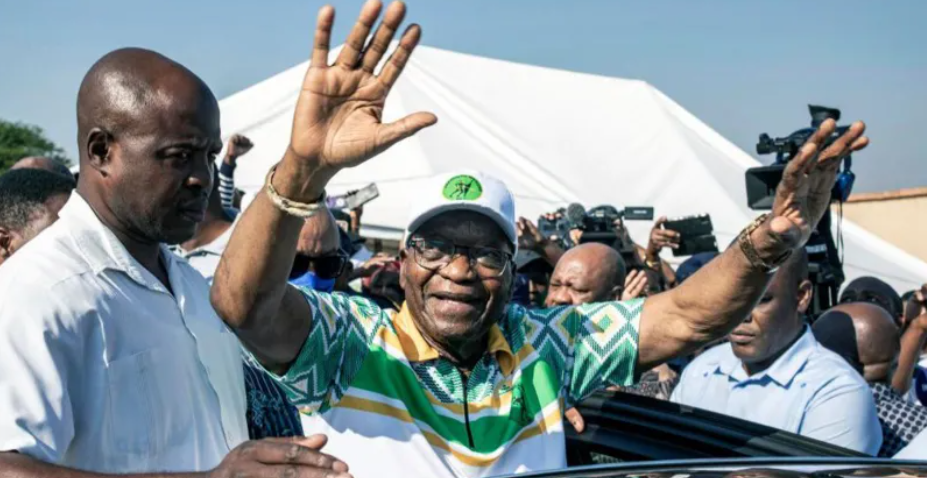Voted in, charged with corruption – dismissed, charged with sexual assault – found not guilty, elected as president, accused of corruption once more – denied anew, removed from power, jailed for disrespecting the court – released, prohibited from being an MP. Almost any of these blows would have ended the careers of most politicians, but not for Jacob Zuma, the politician from South Africa. Similar to a determined boxer, the 82-year-old ex-president might have been knocked to the ground at times, but he has never been knocked unconscious. In the most recent election campaign, he’s been performing his well-known routine, and the outcomes of last week’s ballot reveal he continues to hold significant sway. Leading a fresh party, he challenged the African National Congress (ANC), securing 15% of the votes. The outcomes have been embarrassing for the ANC, the freedom movement formerly guided by Mr. Zuma, as it has surrendered its complete control of parliament for the first time in 30 years – and the so-called “Zuma wave” bears some responsibility for this. At the heart of Durban, the primary city in KwaZulu-Natal province, Mr. Zuma’s cheerful expression shines from nearly every lamppost on election posters of his newly established party, uMkhonto weSizwe (MK) or Spear of the Nation, featuring green-and-black colors. There’s no question about the elderly leader’s revered position in his homeland, where he’s admired for maintaining his Zulu cultural and traditional beliefs. He’s praised for being a peacemaker during political turmoil in the early 1990s, which nearly disrupted the nation’s shift to democracy. Over 20 years ago, he was acknowledged for persuading voters in KwaZulu-Natal to switch allegiance from the Zulu nationalist Inkatha Freedom Party to the ANC. Zuma during swearing in 2009 In this year, he managed to bring his faithful followers along to MK, named after the ANC’s previous armed division, bearing immense political significance due to its efforts in battling against white-minority governance. A week before the 29th of May election, the presentation of MK’s manifesto at a crowded stadium with a seating capacity of 40,000 sent a clear message that “uBaba” (father), as Mr. Zuma is affectionately called, and has returned. Despite the blistering sun, his countless supporters in the crowd shouted: Zuma! Zuma! A voice cried out: Uyinsizwa nxamala, which roughly means in Zulu a brave fighter who never retreats. When he arrived at his voting spot on Election Day, a small primary school lacking proper sanitation, the leader of the MK party was welcomed by hundreds of individuals shouting out his clan titles: “Msholozi, Nxamalala, Maphum’ephethe.” South Africans in a rally Before casting his vote, the ex-president acknowledged the crowd with a wave and a smile, then proceeded to enter a classroom. Exiting the voting venue, his backers serenaded him with a Zulu tune in support of Zuma, a song that gained popularity years back when the ex-president faced corruption allegations. They sang a line that goes, What has Zuma done? Don’t fall for the lies spread by those big companies controlled by rich white people. While most politicians have a group of loyal supporters, what distinguishes Mr. Zuma is his genuine connection with the impoverished and marginalized. This could clarify why he remains popular even when confronted with multiple scandals and severe accusations. Back in 2018, it appeared his fortune had come to an end when he was ousted from his position as president, amid a string of corruption charges, all of which he refuted. Cyril Ramaphosa took over as president, and Mr. Zuma was cast aside as a political outcast and a tarnished figure in politics. Three years back, his situation worsened: he was imprisoned for disobeying a court order to provide testimony in a corruption probe from his nine-year tenure as president. The riots following his apprehension in July 2021 marked the most lethal unrest since the demise of white-minority governance in 1994, resulting in the fatalities of over 300 individuals. Zulu woman protesting holding a placard Given a 15-month sentence, he was freed by President Ramaphosa after just three months served, in an effort to appease both him and his enraged followers. Only a short while back, it appeared Mr. Zuma faced another setback when he was legally prevented from running for a parliamentary seat due to his conviction. But voters didn’t seem to care about any of that, and his knack for outmaneuvering his political rivals was clear, as recognized by the ANC. Jacob Zuma is a significant presence in South African politics… we never overlooked his influence, confessed ANC secretary-general Fikile Mbalula, reflecting on his party’s poor showing. Even though he’s been temporarily removed from the ANC, Mr. Zuma still holds membership in the party that played a pivotal role in ending apartheid. Having received no formal education and growing up in humble circumstances, his involvement in the anti-apartheid movement led to his imprisonment for 10 years at the infamous Robben Island penitentiary, where he was incarcerated alongside Nelson Mandela. When the white government lifted the ban on the ANC in 1990, Mr. Zuma came back from exile and climbed the party’s hierarchy. By 1999, he was named the country’s deputy president. In 2005, he became embroiled in corruption accusations related to a 1999 arms agreement, which he refuted, and as a result, he was dismissed by then-President Thabo Mbeki. The legal proceedings regarding this matter persist, and he is still confronted with charges linked to the multi-billion dollar controversy. In December of that same year, allegations surfaced that he had sexually assaulted the daughter of a fellow party member. While he acknowledged engaging in sexual activity with the woman, who was HIV positive, he maintained that it was consensual. In December of that same year, allegations surfaced that he had sexually assaulted the daughter of a fellow party member. While he acknowledged engaging in sexual activity with the woman, who was HIV positive, he maintained that it was consensual. The next year, he was cleared of the rape charges. Afterwards, he clawed his


